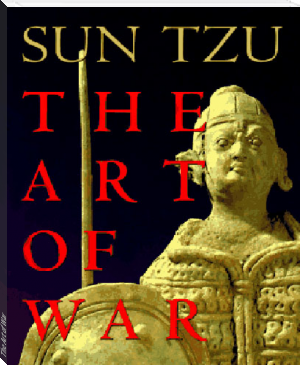The Art of War, Zi Sun [best book recommendations TXT] 📗

- Author: Zi Sun
- Performer: 0976072696
Book online «The Art of War, Zi Sun [best book recommendations TXT] 📗». Author Zi Sun
33. How to make the best of both strong and weak—that is a question involving the proper use of ground.
[Mei Yao-ch`en's paraphrase is: "The way to eliminate the differences of strong and weak and to make both serviceable is to utilize accidental features of the ground." Less reliable troops, if posted in strong positions, will hold out as long as better troops on more exposed terrain. The advantage of position neutralizes the inferiority in stamina and courage. Col. Henderson says: "With all respect to the text books, and to the ordinary tactical teaching, I am inclined to think that the study of ground is often overlooked, and that by no means sufficient importance is attached to the selection of positions… and to the immense advantages that are to be derived, whether you are defending or attacking, from the proper utilization of natural features." [2] ]
34. Thus the skillful general conducts his army just as
though he were leading a single man, willy-nilly, by the hand.
[Tu Mu says: "The simile has reference to the ease with
which he does it."]
35. It is the business of a general to be quiet and thus
ensure secrecy; upright and just, and thus maintain order.
36. He must be able to mystify his officers and men by
false reports and appearances,
[Literally, "to deceive their eyes and ears."]
and thus keep them in total ignorance.
[Ts`ao Kung gives us one of his excellent apophthegms: "The troops must not be allowed to share your schemes in the beginning; they may only rejoice with you over their happy outcome." "To mystify, mislead, and surprise the enemy," is one of the first principles in war, as had been frequently pointed out. But how about the other process—the mystification of one's own men? Those who may think that Sun Tzu is over-emphatic on this point would do well to read Col. Henderson's remarks on Stonewall Jackson's Valley campaign: "The infinite pains," he says, "with which Jackson sought to conceal, even from his most trusted staff officers, his movements, his intentions, and his thoughts, a commander less thorough would have pronounced useless"—etc. etc. [3] In the year 88 A.D., as we read in ch. 47 of the HOU HAN SHU, "Pan Ch`ao took the field with 25,000 men from Khotan and other Central Asian states with the object of crushing Yarkand. The King of Kutcha replied by dispatching his chief commander to succor the place with an army drawn from the kingdoms of Wen-su, Ku-mo, and Wei-t`ou, totaling 50,000 men. Pan Ch`ao summoned his officers and also the King of Khotan to a council of war, and said: 'Our forces are now outnumbered and unable to make head against the enemy. The best plan, then, is for us to separate and disperse, each in a different direction. The King of Khotan will march away by the easterly route, and I will then return myself towards the west. Let us wait until the evening drum has sounded and then start.' Pan Ch`ao now secretly released the prisoners whom he had taken alive, and the King of Kutcha was thus informed of his plans. Much elated by the news, the latter set off at once at the head of 10,000 horsemen to bar Pan Ch`ao's retreat in the west, while the King of Wen-su rode eastward with 8000 horse in order to intercept the King of Khotan. As soon as Pan Ch`ao knew that the two chieftains had gone, he called his divisions together, got them well in hand, and at cock-crow hurled them against the army of Yarkand, as it lay encamped. The barbarians, panic-stricken, fled in confusion, and were closely pursued by Pan Ch`ao. Over 5000 heads were brought back as trophies, besides immense spoils in the shape of horses and cattle and valuables of every description. Yarkand then capitulating, Kutcha and the other kingdoms drew off their respective forces. From that time forward, Pan Ch`ao's prestige completely overawed the countries of the west." In this case, we see that the Chinese general not only kept his own officers in ignorance of his real plans, but actually took the bold step of dividing his army in order to deceive the enemy.]
37. By altering his arrangements and changing his plans,
[Wang Hsi thinks that this means not using the same stratagem twice.]
he keeps the enemy without definite knowledge.
[Chang Yu, in a quotation from another work, says: "The axiom, that war is based on deception, does not apply only to deception of the enemy. You must deceive even your own soldiers. Make them follow you, but without letting them know why."]
By shifting his camp and taking circuitous routes, he prevents the enemy from anticipating his purpose. 38. At the critical moment, the leader of an army acts like one who has climbed up a height and then kicks away the ladder behind him. He carries his men deep into hostile territory before he shows his hand.
[Literally, "releases the spring" (see V. ss. 15), that is, takes some decisive step which makes it impossible for the army to return—like Hsiang Yu, who sunk his ships after crossing a river. Ch`en Hao, followed by Chia Lin, understands the words less well as "puts forth every artifice at his command."]
39. He burns his boats and breaks his cooking-pots; like a shepherd driving a flock of sheep, he drives his men this way and that, and nothing knows whither he is going.





Comments (0)